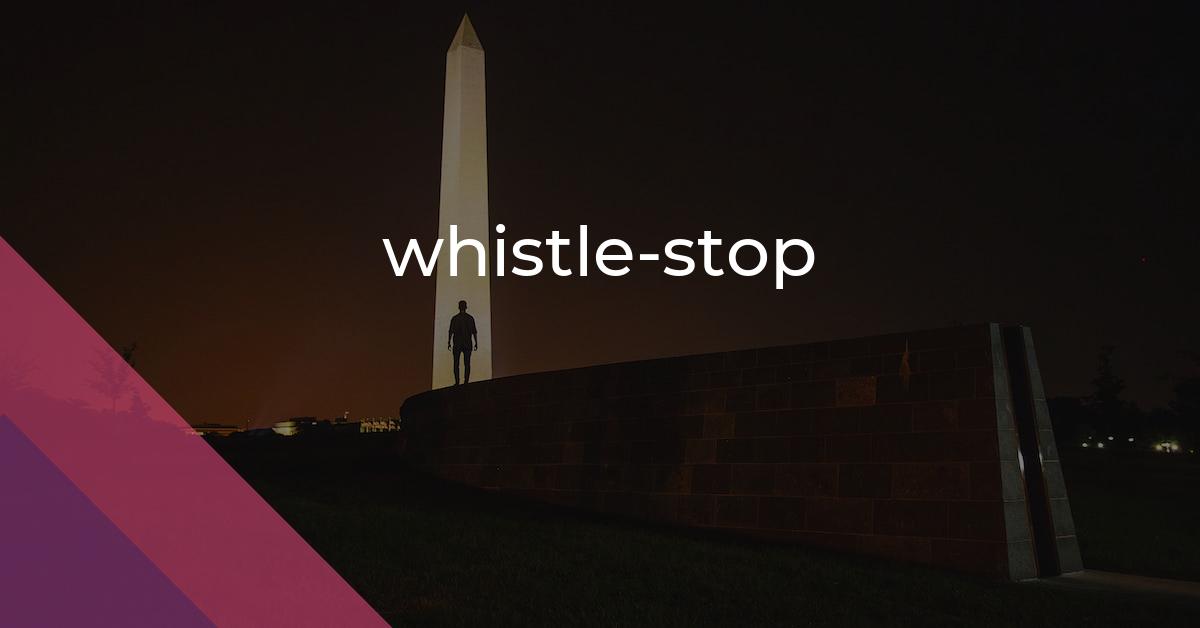whistle-stop: Idiom Meaning and Origin
What does ‘whistle-stop’ mean?
The idiom "whistle-stop" refers to a brief or quick stop, typically made by a train or a political campaign, where only a short period of time is spent. It suggests the idea of a quick visit or a short stopover, often without much importance or significance.

Idiom Explorer
The idiom "yellow light" refers to a cautionary signal in traffic, signaling drivers to slow down or prepare to stop. In a metaphorical sense, it represents a warning or a sign of caution in various situations, advising individuals to proceed with care or be aware of potential risks.
The phrase "whistle past the graveyard" means to act courageously or cheerfully in a dangerous or frightening situation in order to mask one's fear or anxiety.
The idiom "whistle in the wind" means to make an attempt or statement that has no result or impact, as the sound of a whistle is often carried away and lost in the wind.
The idiom *whistle in the dark* means to pretend to be brave or optimistic in a difficult or frightening situation, often to hide one's fear or uncertainty.
The idiom "whistle for" means to expect or hope for something that is unlikely to happen or is not forthcoming.
The idiom "whistle Dixie" means to engage in self-delusion or excessive optimism about a situation that is unlikely to be successful or favorable.
The idiom "whisk off" means to quickly and abruptly take someone or something away to another location, often with a sense of urgency or haste. It conveys the idea of rapidly moving or removing someone or something from one place to another.
The idiom "whisk away" means to quickly and unexpectedly take someone or something away from a place or situation.
The idiom "whip through" means to do something quickly and effortlessly, often completing a task or activity in a short amount of time.
Whistle-Stop Decoded
The idiom "whistle-stop" has a few different meanings depending on how it is used in a sentence. One meaning of this idiom is a small town or an unimportant place. It can also describe a brief or insignificant visit. Another meaning of "whistle-stop" is a political campaign tour or speech given by a candidate while traveling by train. It can also refer to a train station or a small stop along a train route. Let's explore each of these meanings further.
The origin of the idiom "whistle-stop" dates back to the early 19th century. It comes from the practice of train conductors sounding the whistle as a signal for the train to stop at small, often unimportant, stations along the route. These stations were usually small and of little significance compared to major cities or destinations. Over time, the term "whistle-stop" became associated with these lesser-known places. Eventually, it extended to represent any visit that is brief or insignificant.
The use of "whistle-stop" gained popularity in politics during the late 19th and early 20th centuries. In the United States, presidential candidates would often travel by train to visit different towns and communities during their campaigns. These campaign tours included speeches and rallies, and they would make stops at small, rural towns along the way. The term "whistle-stop" became synonymous with these campaign stops, where the candidate would get off the train and address the local residents.
Although train travel is no longer the primary mode of transportation for political campaigns, the term "whistle-stop" continues to be used metaphorically to describe a campaign event or speech that takes place in smaller, less significant locations. It carries a sense of connecting with ordinary people and reaching out to voters at a grassroots level.
Outside of politics, the idiom "whistle-stop" has also found its way into everyday conversation. It is often used to describe a brief or unimportant visit. For example, someone might say, "I just made a whistle-stop at the grocery store to grab some milk." In this context, the idiom emphasizes the short duration and lack of significance of the visit.
Overall, the idiom "whistle-stop" encompasses various meanings related to small, unimportant places, brief visits, and political campaign events. Its origins lie in train travel and the practice of stopping at lesser-known stations along the route. While its use in political campaigns has evolved, the idiom continues to be used to describe any fleeting or inconsequential visit. The term's history and multifaceted nature make it a fascinating aspect of the English language, highlighting the interplay between language, context, and cultural practices.
Now let's explore how "whistle-stop" relates to other idioms and phrases:
The first idiom we will discuss is "swing through." When used in the context of "whistle-stop," "swing through" can refer to the practice of a candidate making a brief campaign stop in a town or community as part of a larger campaign tour. This idiom suggests that the visit is quick and that the candidate is merely passing through on their way to other, potentially more important, destinations.
The next idiom is "stop someone in their tracks." This phrase can be related to "whistle-stop" in the sense that a whistle-stop visit, whether it be political or personal, can catch someone's attention and interrupt their normal activities. Just as a train coming to a screeching halt can stop people in their tracks, a sudden and unexpected visit can do the same.
The final idiom is "a short drop and a sudden stop." While not directly related to the meaning of "whistle-stop," this phrase invokes a sense of sudden and abrupt endings. Similarly, a whistle-stop visit is often brief and seemingly inconsequential, with little to no lasting impact. The idiom can capture the fleeting nature of both the visit and its significance.
Example usage
Examples of how the idiom *whistle-stop* can be used in a sentence:
- He visited several cities on his whistle-stop tour.
- She gave a whistle-stop speech to rally support for her campaign.
- I'm planning a whistle-stop tour of Europe to visit all the major cities.
More "Travel" idioms



